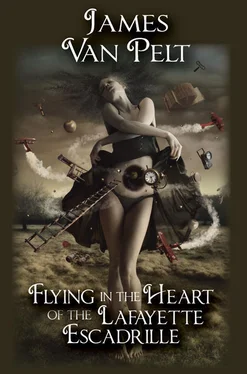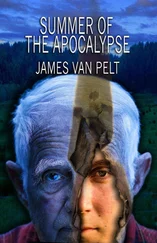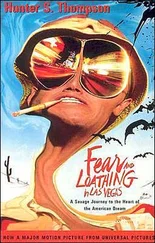Someone yelled in the distance, a child, and Poul jumped. He stood, his hands resting on the car’s roof. Between the cottage and the elms beside it, a slice of lake glimmered, and a hundred feet from shore, a group of children played on a permanently anchored oil drum and wood decked diving platform, whooping in delight.
“I’d like mustard on mine, and then I’ll go see the kittens,” said Savannah. She had her duffel bag over her shoulder—it dragged on the ground—and was already moving toward the back door.
“Sure, Speedy,” Poul said, although Savannah was already out of earshot. Poul arched, pushing his hands into his back. Sunlight cut through the leaves above in a million diamonds. He left the baggage in the car to walk to the shore. To his left, a mile away, partly around the lake’s curve, Kettle Jack’s long pier poked into the water. A dozen sailboats lay at anchor, their empty masts standing rock still in the windless day. Part way there, Leesa walked determinedly on the dirt path toward the lodge. Slender as the day they married. Long-legged. Satiny skin that bronzed after two days of sun. He remembered warm nights marvelling at the boundaries where the dark skin became white, how she murmured encouragement, laughing deep in her throat at shared joys.
Poul unpacked the van. Most of the beach toys went around front. He stuck the yellow raft on a high, open shelf in back of the cottage where rakes and old oars were stored. Maybe she’d forget they had it.
A screen slapped shut behind him. Savannah came down the steps. “I couldn’t find the hot dogs, and something smells bad in the kitchen. I’m going to count fish.”
Poul said, “Let’s go together. Life vest first.” He found one in a pile in the storage chest against the tiny boathouse. It had a solid heft that reassured him.
She pouted as he put it on. It smelled of a winter’s storage, a musty, gray odor that rose when he squeezed the belt around her. “Guess you aren’t the same size as last summer? Can’t have you grow up this fast. We’ll have to quit feeding you.”
Savannah didn’t smile. “Da-ad,” she said.
Minnows darted away when they stepped on the pier. To the left, weeds grew up from the mucky bottom, starting as a ten-foot wide algae belt next to the shore, and waving languidly below after that until the lake became too deep to see them. To the right, white sand began at a railroad tie border six feet from the cottage and reached into the water, a smooth, pale stretch for thirty feet. It cost two-hundred dollars every other season to have several dump truck loads of sand poured and spread to create the beach. A blunt torpedo silhouette a foot long moved toward deeper water. Probably a bass. Most perch were stockers in the lake, and a foot long blue gill would be a trophy. Only catfish and bass reached respectable size. Poul watched the fish gliding at the sand’s edge, perfectly poised between the artificial beach and the lake’s invisible depths. Once he’d stood at the same spot with Neal, fascinated by a three-foot long catfish, nosing its way beneath their feet. Through their reflections, through Neal’s glasses and wide brown eyes and sun-blond hair, and through Poul’s dark hair and blue eyes, they’d watched its broad, black back. Later they’d baited huge treble hooks with liver or soap, but the fish never returned. Dad had told them some catfish lived longer than men. That same catfish might still be prowling the lake’s bottom. Would it remember a summer of two small boys? Or was it now a ghost? Did old ones die to haunt the undersides of piers? Were there places even fish were afraid to go?
Poul shivered and glanced up. Savannah was on her stomach at the pier’s end. Her knees not touching wood, her weight precariously balanced. His throat seized up, and he walked quickly, almost a jog (although he didn’t want to scare her) to where she looked into the water. Poul put his hand on her back, holding her there.
Savannah’s hands were flat out, fingers splayed, nearly touching the surface. Without a breeze the lake was smooth as glass. “Look, Daddy. I’m underwater. Do you think she sees me?” Her reflection stared at her, its hands almost touching her own, the vision of a little girl six inches deep, looking up.
Poul’s tongue felt fat in his mouth, and it was all he could do to speak without a quiver in the voice. “Yes, dear. You’re lovely. Now let’s go in, and I’ll find the hot dogs.”
Savannah held his hand as they walked toward the cottage. The boards creaked underfoot. Through the wide gaps, water undulated in a slow, fractional swell. He shook his head. She’d never been in danger. Even if she’d fallen in, the life vest would have popped her to the surface, and he was right there. He wished he’d signed her up for swimming lessons during the winter. Poul kept his head down, watching his feet next to Savannah’s, her white sneakers matching his small steps. She gripped his little finger, and he smiled. After lunch, he’d break out the worms and bamboo poles (anything to avoid the clear-bottomed raft). He’d have to dig up the tall, skinny bobbers and show her again how to mount the bait on the hook.
He remembered fishing with Neal. Dad used an open bail casting reel, sending his lures to splash far away, but they had as much action tossing their bait a few feet from the boat. Poul would stare at the narrow, red and white bobber’s point, held upright by the worm’s weight and a couple of lead shot. The marker twitched, sending ripples away. It twitched again. “Something nibbling you, Poul,” said Neal, his own pole forgotten. “Yeah,” said Poul, concentrating on the bobber, which wasn’t moving now. He imagined a fish eyeing it below. Could be a bass, or maybe even a pike, like the stuffed one mounted on a board above the bar at Kettle Jacks, its long mouth open and full of teeth.
Savannah cried, “Help him, Daddy.”
“What?”
She pulled away, dropped to her knees and poked her head over the pier’s side, trying to look under. “Help him!”
“What, Savannah? What?” Poul knelt beside her; a splinter poked his shin. “Don’t fall in now!”
She sat up, her hair wet at the tips where it had dipped. “Where’d he go? Didn’t you see him? He was reaching up between the boards, Daddy. You almost stepped on him.”
The sun dimmed, and everything around them faded. Only Savannah was clear. Dimly children shrieked on the distant diving platform. When he spoke, it sounded to him as if they were in a bubble: his faint voice travelled no more than a yard away. “What did you see, Speedy? Who was reaching up?”
Her lip quivered. “The boy, Daddy. He was under the pier. I saw his fingers right there.” She pointed. “He was stuck under the pier, but when I looked, he’d gone away. Where do you think he went to, Daddy?”
Between the boards, the lake breathed gently, the surface smooth and untroubled. A crawdad crept along the muck. Poul watched it through the gap. “I don’t think there was anyone there, Speedy. Maybe your eyes played a trick on you.”
Legs crossed, her hands in her lap, Savannah studied the space between the boards for a moment. Slowly, she said, “My eyes don’t play tricks.” She paused. “But my brain might have imagined it.”
Poul released a long, slow lung full of air. He hadn’t known he’d been holding it. “If you’re hungry, sometimes your brain does funny things.” The sun brightened. Poul shivered, and he realized sweat soaked his shirt’s sides. “Let’s go in and have a hot dog.”
She nodded. He had to open the porch door for her; it was a high step up, and her fingers barely wrapped around the nob. Neal had been so proud his last summer when he could grip it.
Later, while Savannah put mustard on her meal, Poul said, “Why did you think it was a boy under the pier if all you saw was his fingers?” Savannah swallowed a bite.
Читать дальше










